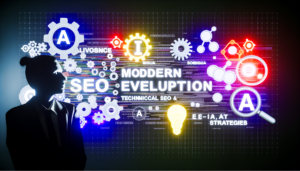In the ever-evolving landscape of digital marketing, **artificial intelligence (AI)** has emerged as a transformative force in shaping modern SEO strategies. Once reliant on manual keyword research and static algorithms, SEO now thrives on AI-driven tools that analyze vast datasets, predict user behavior, and optimize content with unprecedented precision. This article explores how AI is redefining SEO practices, from automating repetitive tasks to enabling hyper-personalized user experiences. We’ll delve into its role in content creation, technical SEO enhancements, and the ethical considerations that come with relying on machine learning. Whether you’re a marketer, business owner, or tech enthusiast, understanding AI’s impact on SEO is critical to staying competitive in an increasingly algorithm-driven world.
The Evolution of SEO Through AI Automation
Gone are the days of manually tracking keyword rankings or guessing search intent. AI-powered platforms like **BrightEdge** and **MarketMuse** now automate time-consuming tasks, such as keyword clustering, competitor analysis, and technical audits. Machine learning algorithms process billions of search queries to identify patterns, enabling marketers to prioritize high-impact keywords and fix crawl errors in real time. For instance, tools like **Screaming Frog** leverage AI to detect broken links or duplicate content, streamlining site health improvements. Automation not only accelerates workflows but also reduces human error, allowing SEO professionals to focus on strategic decisions rather than repetitive chores.
Personalization at Scale: AI’s Role in User-Centric SEO
Modern users demand tailored experiences, and AI makes this possible by analyzing individual behaviors, demographics, and search histories. Platforms like **HubSpot** and **Dynamic Yield** use predictive analytics to serve personalized content recommendations, dynamic meta descriptions, and location-specific landing pages. For example, an e-commerce site might deploy AI to adjust product descriptions based on a user’s past purchases or browsing habits. This hyper-personalization improves engagement metrics—such as bounce rates and session durations—which indirectly boost rankings. By aligning content with user intent, AI ensures that SEO strategies resonate deeply with target audiences while adhering to Google’s E-E-A-T (Experience, Expertise, Authoritativeness, Trustworthiness) guidelines.
Content Optimization: From Keywords to Semantic Intelligence
AI has shifted SEO content beyond keyword density to **semantic search optimization**. Natural Language Processing (NLP) models, like Google’s BERT, understand context and synonyms, enabling content to answer complex queries conversationally. Tools such as **Clearscope** and **Frase.io** analyze top-ranking pages to suggest semantically relevant terms, ensuring content aligns with search engine expectations. Moreover, AI-driven platforms like **Jasper** or **Copy.ai** generate SEO-friendly drafts, though human oversight remains crucial for nuance. Voice search optimization further exemplifies this shift—AI parses long-tail, conversational phrases (e.g., “Where’s the nearest vegan café open now?”), requiring content to mimic natural speech patterns.
Ethical Challenges and the Future of AI in SEO
While AI offers immense potential, it raises ethical dilemmas. Over-reliance on automation risks homogenized content, as tools may recycle popular phrases without originality. Additionally, biases in training data can skew SEO recommendations, perpetuating inequities in search results. Transparency is another concern—users rarely know when AI curates their search experiences. Looking ahead, advancements in **generative AI** and visual search (e.g., Google Lens) will further blur the lines between SEO and user experience. Marketers must balance automation with human creativity, ensuring AI enhances—rather than replaces—authentic, value-driven strategies.
**In conclusion**, AI has irrevocably transformed SEO by automating tedious tasks, personalizing user journeys, and refining content through semantic intelligence. However, its power comes with responsibilities: avoiding ethical pitfalls and maintaining a human touch in strategy development. As search algorithms grow more sophisticated, marketers must stay agile, leveraging AI as a tool to amplify—not dictate—their efforts. The future of SEO lies in harmonizing machine efficiency with human insight, ensuring brands remain visible, relevant, and trustworthy in an AI-driven digital ecosystem.


